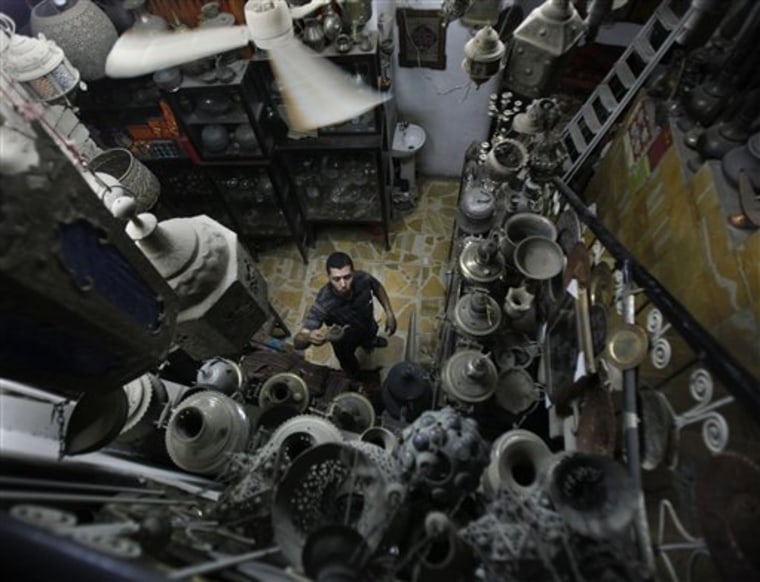Antique dealer Riyadh al-Khafaf has so few customers he hasn't bothered to dust his collection of fine metalware from the early 20th century. Other dealers say they can go for days without seeing even a browser.
But while their business may be sparse, the two dozen or so antique shops in the Iraqi capital boast treasures of museum quality. Like Baghdad, a city of mosques with turquoise tiled domes and streets divided by barbed wire and blast walls, the shops' contents speak of both Iraq's recent dark days and its more gloried past.
"The story of Iraq is here if you care to look closely," Abdul-Kareem Yahya, a 51-year-old father of five, said from behind a desk at his downtown antique shop. Behind him sat Ottoman-era swords, engraved silver trays and a tea set bearing the image of Iraq's last king.
The antique dealers — some retired security officers, military veterans or ex-government employees — are also proof of the resilience of Baghdad's people in surviving decades of hardship from war, U.N. sanctions and occupation by a U.S.-led international force.
Yahya said the lack of business for antique shops reflects Iraq's isolation from the rest of the world and the still tenuous security situation. While he and other dealers say the pullout of U.S. soldiers from Baghdad last week under an agreement with Iraq's government removes one magnet for insurgent attacks, they concede they're not soon likely to see a rush of tourists to buy their wares.
Market flooded with treasures
Recent history provides rich sources for Baghdad's antique market. After Iraq's 1990 invasion of Kuwait, goods from the neighboring country's wealthy homes and its national museum — famed for Islamic art and Quranic manuscripts — were hauled back here. More treasures came with the looting of Iraq's own national museum and Saddam Hussein's palaces in the lawless days after the American-led invasion of 2003.
Antique dealers said some looted items had been sold in Baghdad, but they all denied handling any suspect goods themselves. They said Iraq itself — with a population once among the wealthiest and best-educated in the Middle East — provides many early 20th century antiques from families who fell on hard times during 13 years of U.N. sanctions slapped on Iraq for invading Kuwait in 1990.
Some of the best evidence of better days can be found by climbing the shaky stairs to al-Khafaf's shop on a street along the River Tigris in Baghdad's old quarter. Sitting under a coat of dust on the shop's floor are silver-plated brass boxes in which wealthy women kept their toiletries and engraved water pitchers that the rich used to wash guests' hands after feasts.
Also on offer are floral-shaped silver candlesticks fashioned by Baghdad's renowned Jewish craftsmen, members of a religious community that went back more than two millennia and numbered upwards of 100,000 in the 1930s. Now it has been reduced to just a few people by the discrimination of ultra-nationalist governments and the lure of living in Israel.
"The Jewish craftsmen of Baghdad were at their best with silver and gold," said al-Khafaf, explaining a one-time informal division of specialization among artisans of different religious communities. "Muslims, on the other hand, were best with brass," said the 48-year-old, who has a day job as a veterinarian.
In the downtown antique shops, there also are fine china tea sets bearing images of Faisal II, the last of Iraq's kings. Faisal II was murdered along with close family members in a 1958 military coup that heralded the start of years of political instability, genocide and human rights abuses. Complete sets can sell for $1,000.
Among other goods that were in wealthy Iraqi families for generations but went on the market during the years of crippling U.N. sanctions are fine carpets, U.S.-made 19th century clocks, dinner sets and old paintings.
"The antiques sold by families during sanctions were mostly bought by Iraqis who had not been affected by the sanctions," said Issam Hassan, a dealer in Baghdad's old quarter.
"Some are coming to buy back what they sold, but they don't find them and they look for similar items," said Hassan, who said he had survived by selling canned goods on the sidewalk outside his home while his store was closed for two of the past six years because of security fears.
Violence scares away buyers
Hassan, al-Khafaf and Yahya say Baghdad's "antique reserves" could still grow as the country slowly opens up to its traditional visitors from Iran, the Indian subcontinent and Azerbaijan, an oil-rich Central Asian nation whose majority Shiites once came in large numbers as pilgrims to Iraq's religious sites.
Many rich items still in the homes of old Baghdad families could eventually reach the market, they said.
But the dealers acknowledge it will be many years before Baghdad can rival the vibrancy of more established Middle Eastern antique markets such as the Syrian capital, Damascus, and Isfahan in Iran. And, they complained, it is largely because potential visitors are scared off by Iraq's persistent violence.
"We used to be open for business until midnight before the war," said Tawfeeq al-Shikhli, a 63-year-old antique dealer. "Now, we close by early afternoon because of security."
Al-Shikhli, clad in a beige Arab robe, sat outside his vast shop which looked deceptively small from the outside. On the second floor, hundreds of unsold carpets from Iran, India and Afghanistan were piled on shelves nearly ceiling high.
"I can sell all this if tourists were coming to Iraq," al-Shikhli's 29-year-old son Waleed said as he gestured toward the rugs. "The prices are very reasonable, but people don't have money to spare."
More on Iraq
